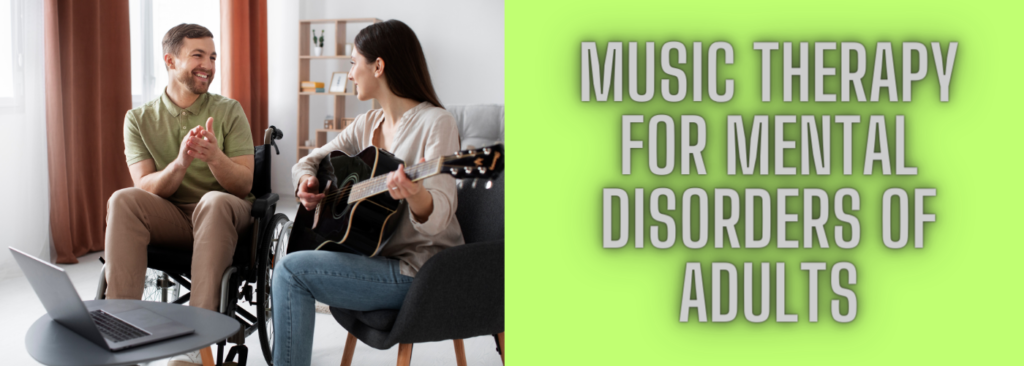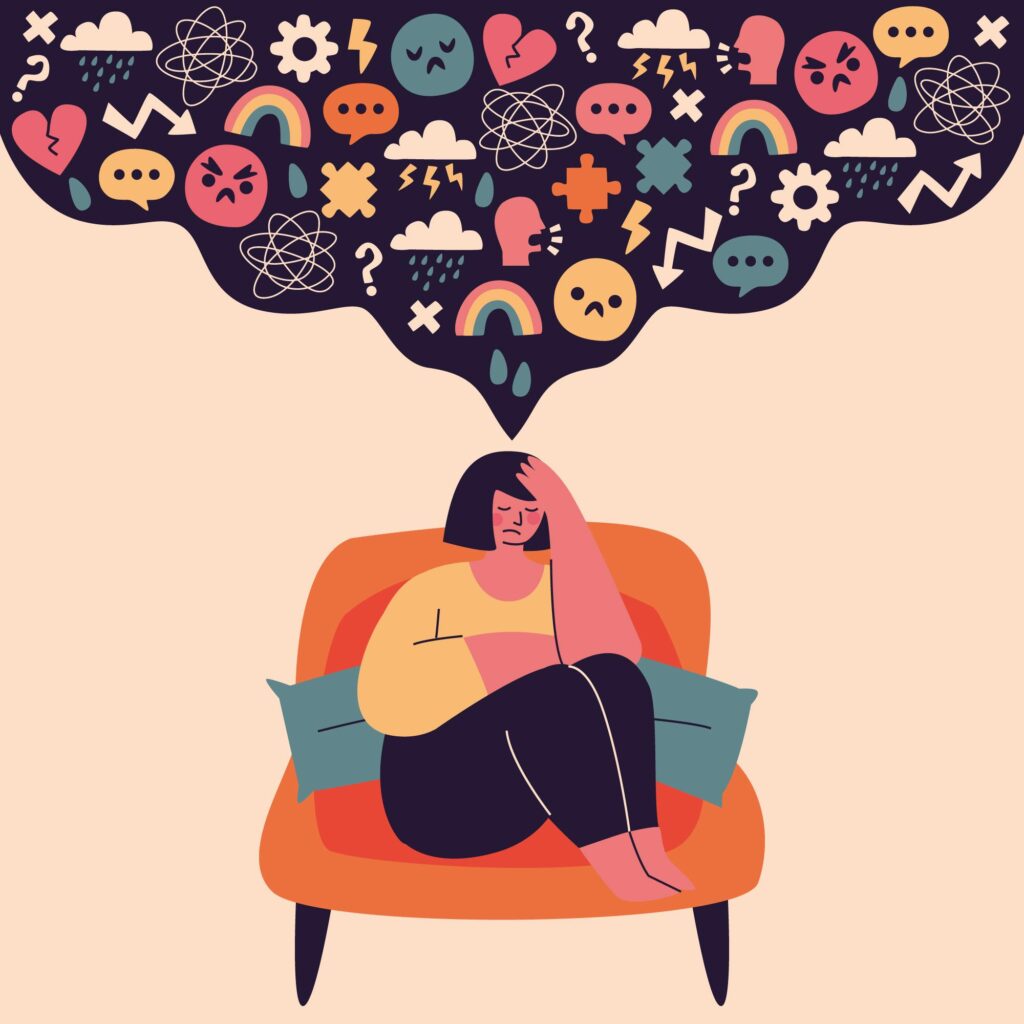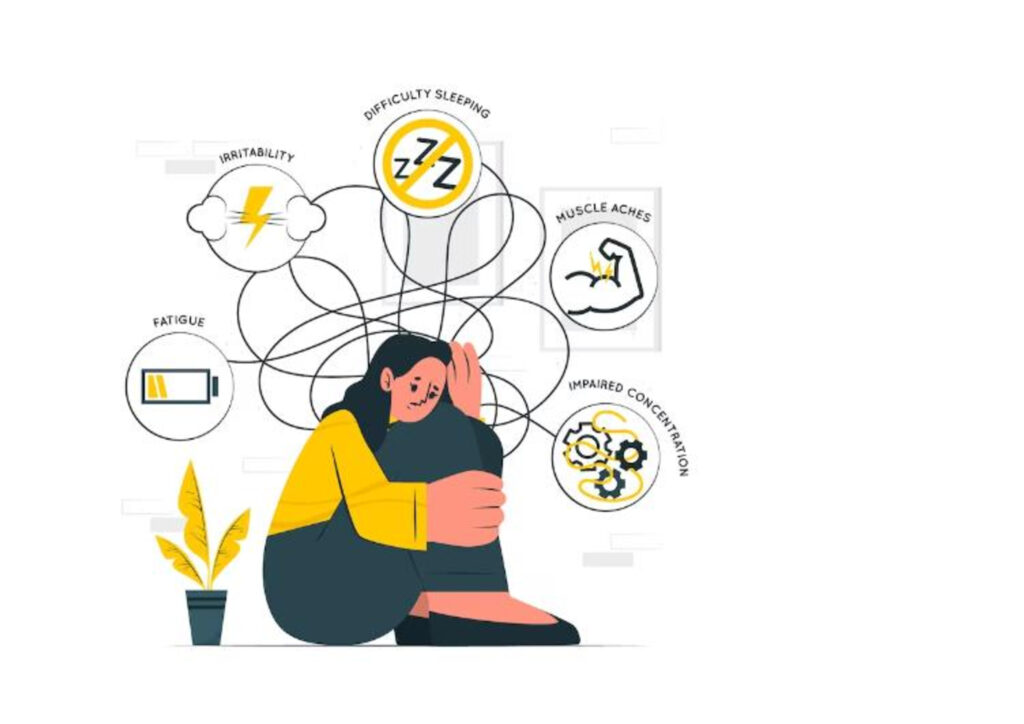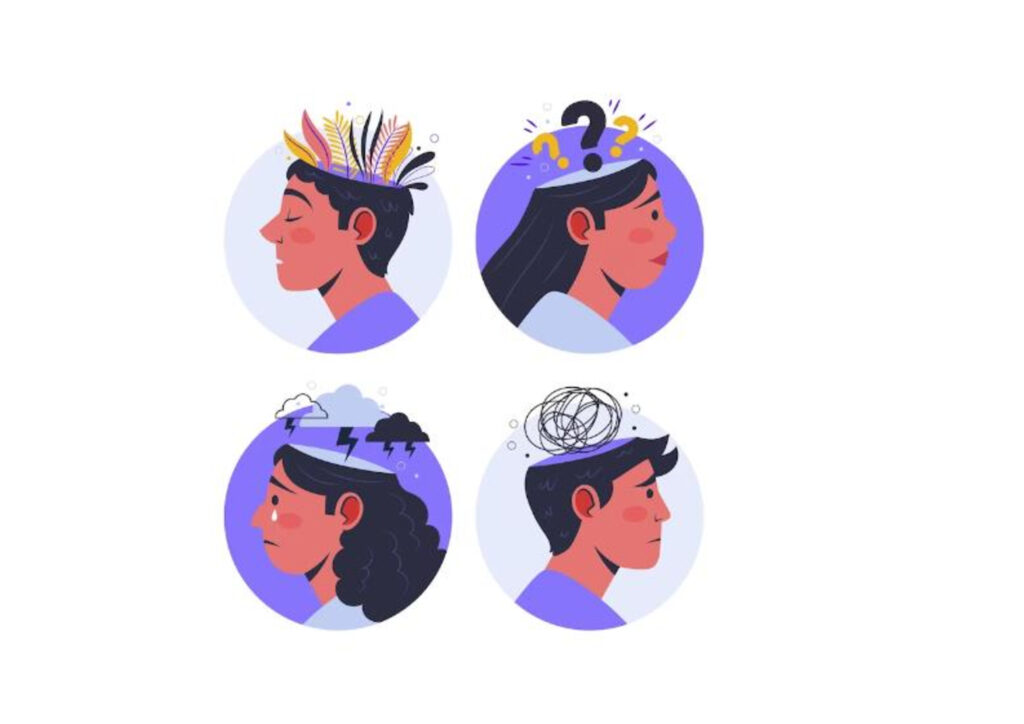
Table of Contents : Music Therapy for Mental Disorders of Adults
Music treatment, a deep rooted practice, is earning respect as an integral asset in tending to mental problems among grown-ups. In our current reality where the burdens of present day life frequently negatively affect mental prosperity, the restorative force of music offers an agreeable arrangement. How about we dive into the domain of music treatment and investigate its significant effect on the psychological well-being of grown-ups.
Introduction
In the clamoring cadence of our regular routines, we frequently find comfort in the delicate notes of a song or the elevating beats of our #1 tunes. Music, with its general language, has the ability to inspire feelings, trigger recollections, and make a feeling of association. Past its diversion esteem, music has likewise arisen as an integral asset in the domain of emotional well-being. In this blog, we will investigate the mitigating ensemble of “Music Treatment for Mental Issues in Grown-ups” and how it fills in as an agreeable road towards mending.

Understanding Mental Disorders in Adults
Mental prosperity issues impact an immense piece of the adult people, influencing their everyday schedules and overall success. From disquiet and distress to extra astounding issues, the prerequisite for fruitful accommodating mediations is more dire than some other time in ongoing memory.
The Rhythmic Resonance:
Envision a delicate song, winding through the maze of your viewpoints, making a relieving congruity that reverberations inside your spirit. This is the embodiment of music treatment, an all encompassing methodology that takes advantage of the recuperating force of sound to address emotional wellness challenges looked by grown-ups.
Scientifically Speaking:
Research has enlightened the many-sided association among music and mental prosperity. Neurologically, music initiates various areas of the mind, affecting feelings, memory, and, surprisingly, actual reactions. For grown-ups wrestling with mental problems, this neurological orchestra can be a passage to close to home delivery, self-disclosure, and mending.

The Therapeutic Power of Music
Going back hundreds of years, music has been recognized for its capacity to summon feelings and make a significant effect on people. Experimentally, music treatment has been found to animate different region of the cerebrum, impacting temperament, and improving mental capabilities.
How Does Music Therapy Work?
The mental components behind music treatment include the mind’s reaction to mood, tune, and agreement. Through cautiously arranged melodic encounters, people can communicate and manage their feelings, prompting good helpful results.

The Healing Power of Music – Music Therapy for Mental Disorders of Adults
As of late, the area of brain science and psychiatry has seen a developing acknowledgment of the remedial advantages of music for mental prosperity. Music treatment, an organized and proof based practice, includes the utilization of melodic intercessions to address close to home, mental, and social requirements of people. We should investigate how the harmonies and rhythms of music can be a demulcent for different mental issues in grown-ups.
Anxiety and Stress Reduction:Envision a relieving song delicately washing away the nerves and stressors that stick to our psyches. Music has been demonstrated to diminish cortisol levels, the chemical related with pressure. Whether it’s traditional structures, encompassing sounds, or even the cadenced beats of nature, various sorts diversely affect people. Through designated melodic mediations, grown-ups wrestling with nervousness find a quieting retreat in the remedial soundscape.
Depression and Mood Enhancement: Wretchedness frequently stirs up misgivings about one’s personal scene, making it trying to encounter delight or inspiration. Music treatment, notwithstanding, can act as a reference point of light. Peppy tunes, customized playlists, and expressive reverberation can assist with raising state of mind, offering a hint of something to look forward to those exploring the profundities of wretchedness. Like finding a companion in a tune gets it and identifies judgment.
Cognitive Rehabilitation: For grown-ups managing mental impedances, for example, those related with Alzheimer’s or horrendous cerebrum wounds, music treatment turns into a useful asset for mental restoration. Songs can go about as mental aides, setting off recollections and upgrading mental capabilities. Through cadenced activities and melodic games, specialists tap into the cerebrum’s brain adaptability, advancing mental strength and adaptability.
Social Connection and Communication: Mental issues frequently disengage people from their groups of friends, intensifying sensations of forlornness. Music treatment encourages a feeling of association by making a common space for articulation. Bunch meetings energize relational collaborations, advancing correspondence and a feeling of local area. Drum circles, ensemble exhibitions, and cooperative music-production become roads for grown-ups to revamp social ties.
Emotional Expression and Processing: At times, words miss the mark with regards to communicating the profundity of feelings. Music, with its emotive power, gives a non-verbal medium to grown-ups to communicate and handle their sentiments. Whether it’s playing an instrument, singing, or basically paying attention to painstakingly organized playlists, people can explore the complexities of their profound scene in a protected and steady climate.
Post-Traumatic Stress Disorder (PTSD) and the Healing Melody:
The frightful reverberations of horrible encounters frequently resonate in the personalities of grown-ups with PTSD. Music treatment gives a place of refuge to people to face and deal with their feelings. Through painstakingly chosen pieces, specialists guide people on an excursion of recuperating, utilizing the expressive force of music to unravel the bunches of injury bit by bit.
Schizophrenia and the Harmonic Dialogue:
Schizophrenia, with its mind boggling transaction of discernments, can track down a novel outlet in the consonant discourse of music treatment. Act of spontaneity and melodic articulation become instruments for people to externalize their inward encounters. In the realm of sound, they can impart and associate with their feelings in manners that words might battle to convey.
Benefits of Music Therapy for Mental Disorders of Adults
The advantages of music treatment are different, going from close to home articulation and stress decrease to worked on mental capabilities. This segment will investigate these benefits exhaustively, featuring genuine instances of people who have encountered groundbreaking changes.
Tailoring Music Therapy to Individual Needs
Perceiving the uniqueness of every person, music treatment can be customized to address explicit emotional well-being problems. Cooperation with emotional wellness experts guarantees an extensive and customized way to deal with treatment.
Accessible Platforms of Music Therapy for Mental Disorders of Adults
In our advanced age, getting to music treatment has become more advantageous than any time in recent memory. Online stages and concentrated applications give roads to people to integrate music treatment into their day to day schedules, cultivating consistency and long haul benefits.
Real-Life Success Stories
Individual accounts from people who have embraced music treatment will outline its flexibility and adequacy. These accounts act as tributes to the positive effect of music on mental prosperity.
Case Studies and Success Stories
- Genuine models feature the groundbreaking force of music treatment. People describe their own excursions, featuring the positive effect that music has had on their psychological prosperity. These accounts act as encouraging signs for those considering or going through music treatment.
- We should dig into two or three genuine models that grandstand the groundbreaking effect of music treatment on grown-ups confronting psychological wellness challenges.
John’s Journey Through Anxiety: John, a 35-year-seasoned pro, was wrestling with weakening uneasiness that ruined his day to day routine. Customary treatment offered some alleviation, yet it was only after he found music treatment that he encountered a significant shift. Through directed unwinding strategies and customized playlists, John found a remedial getaway in the songs that resounded with his feelings. After some time, he created survival strategies, involving music as a device to deal with his tension and recover a feeling of control.
Elderly Care and Alzheimer’s: In a consideration office taking special care of older people with Alzheimer’s, music treatment turned into a guide of euphoria and association. Occupants, who frequently battled with cognitive decline and correspondence obstructions, tracked down comfort in old songs from before. Music started recollections as well as worked with snapshots of certifiable association among occupants, parental figures, and relatives.
Challenges and Considerations
While music therapy holds immense promise, it’s essential to acknowledge potential limitations and address concerns or misconceptions surrounding its application in mental health treatment.
Integration with Traditional Therapies
Music therapy can complement traditional therapeutic approaches, contributing to a holistic model of mental health care. Understanding its role in conjunction with other therapies is crucial for a comprehensive treatment plan.
Incorporating Music into Daily Life
Beyond formal therapy sessions, incorporating music into daily life can significantly contribute to mental well-being. Creating personalized playlists for relaxation, motivation, or introspection becomes a simple yet powerful self-care tool.
Music Therapy Techniques
This section will explore various techniques used in music therapy, showcasing the diversity of interventions available for addressing different mental disorders in adults.
Research Findings
Recent studies supporting the efficacy of music therapy will be discussed, providing insight into the evolving landscape of research in this field and its implications for future developments.

Music Therapy and Self-Care
Empowering individuals to incorporate music into their self-care routines fosters resilience and mental strength. Whether through active participation or passive enjoyment, music becomes a powerful tool for self-nurturing.
Collaborative Approach in Treatment
While music therapy stands alone as a valuable treatment, its integration with traditional approaches enhances its efficacy. A collaborative approach, involving music therapists alongside other healthcare professionals, ensures a comprehensive and well-rounded treatment plan.

Collaboration with Conventional Therapies:
While music treatment remains all alone as an intense restorative methodology, its mix with regular emotional well-being therapies can improve generally results. Cooperative endeavors between music specialists and conventional specialists can make a complete and fitted way to deal with address the multi-layered nature of psychological well-being issues in grown-ups.
For instance, joining talk treatment with music treatment permits people to investigate their feelings through both verbal articulation and melodic innovativeness. This integrative methodology gives an all encompassing structure that addresses mental, close to home, and tangible parts of mental prosperity, at last contribution a more nuanced and successful treatment procedure.
Overcoming Challenges
Implementing music therapy may face challenges, including skepticism or resistance. Addressing these obstacles head-on and providing education about the benefits of music therapy can pave the way for wider acceptance.
Professional Guidance in Music Therapy
Highlighting the importance of certified music therapists, this section will delve into the training and qualifications required to ensure the effective delivery of music therapy.

Promoting Awareness and Acceptance
Addressing the need for broader understanding and acceptance of music therapy in mainstream mental health discussions is crucial for reducing stigma and encouraging its widespread adoption.
Music Therapy for Specific Disorders
Research highlights the efficacy of music therapy in addressing specific disorders such as anxiety and depression. Understanding how music therapy can be tailored to these conditions adds a targeted dimension to its application.
The Future of Music Therapy
As we look forward, the scene of music treatment keeps on developing. Arising patterns and headways in research open additional opportunities for its application in psychological wellness treatment. The continuous investigation of music treatment’s true capacity proposes a splendid future for its combination into standard emotional well-being care.
The Therapist as Maestro:
At the core of music treatment is the talented specialist, a maestro directing the organization of recuperating tunes. Prepared to comprehend the subtleties of mental problems, these specialists use music as a remedial device, adjusting their way to deal with suit the novel requirements of every person. Their direction changes the restorative space into a cooperative melodic excursion towards mental prosperity.
Beyond the Session:
The effect of music treatment reaches out a long ways past the limits of the treatment room. Empowering people to coordinate music into their regular routines, specialists engage them to make a soundtrack for flexibility. Whether through tuning in, playing instruments, or singing, people can bridle the restorative advantages of music in their continuous excursion towards mental health.

The Transformative Nature of Musical Expression:
Past its mental advantages, music treatment urges grown-ups to investigate their own melodic articulations. Whether playing a guitar, tapping on a drum, or singing genuine verses, people find a method for self-articulation that rises above the constraints of verbal correspondence. In the realm of sound, feelings track down a voice, considering a soothing delivery that can significantly free.
The cadenced and melodic parts of music give an organized at this point adaptable mode for self-articulation. This permits people to impart their sentiments, encounters, and internal conflict in a way that feels bona fide to them. Through this cycle, the helpful excursion reaches out past the treatment room, engaging people to coordinate these expressive methods into their regular routines.
Building Bridges and Fostering Connection:
One of the amazing parts of music treatment lies in its capacity to fabricate spans between people. Bunch music treatment meetings make a common space where members can interface with one another on a significant level. Shared melodic encounters become the establishment for understanding and compassion, encouraging a feeling of having a place that is frequently tricky for those wrestling with mental problems.
The cooperative idea of music-production in a social scene advances social connection, correspondence, and participation. As members synchronize their rhythms and songs, they experience a common excursion that rises above the separating hold of emotional well-being difficulties. In these melodic joint efforts, people find that they are in good company, and the help of others turns into a fundamental harmony in the orchestra of mending.

Empowering Autonomy through Active Engagement:
Music treatment welcomes dynamic commitment, engaging people to play a functioning job in their own mending cycle. Whether through playing an instrument, singing, or making arrangements, people become co-makers of their restorative experience. This dynamic support upgrades a feeling of organization as well as imparts a recharged feeling of direction and achievement.
The method involved with figuring out how to play an instrument, for instance, can be a figurative excursion reflecting life’s difficulties. As people conquer melodic obstacles, they fabricate versatility and adaptable abilities that can be applied to their own battles. This pride adds to the reclamation of confidence and certainty, urgent components on the way to mental prosperity.
Tailoring the Tune to Individual Needs:
Pivotal to the outcome of music treatment is its customized approach. Specialists work intimately with people to figure out their remarkable necessities, inclinations, and difficulties. This tailor-made approach guarantees that the helpful intercessions line up with the singular’s solace level and profound scene.
The flexibility of music treatment permits specialists to draw from a tremendous collection of melodic types and strategies. Whether old style, jazz, rock, or world music, specialists can adjust their way to deal with suit the assorted preferences and social foundations of their clients. This variety improves the openness of music treatment as well as highlights its general allure as a recuperating methodology.
Looking Ahead: A Harmonious Future
As the field of emotional well-being keeps on developing, music treatment stands apart as a flexible and all encompassing way to deal with recuperating. Its capacity to address many mental issues in grown-ups, combined with its painless nature, positions it as a significant supplement to conventional restorative modalities.
The incorporation of music treatment into standard emotional well-being care addresses an amicable future where people can investigate the mending capability of sound close by additional customary mediations. As society puts a rising accentuation on all encompassing prosperity, the remedial force of music can possibly assume a critical part in molding the future scene of psychological well-being care.
Cultivating Resilience Through Musical Expression:
The excursion of psychological wellness is a nonstop cycle, and the abilities gained through music treatment can contribute fundamentally to a singular’s flexibility. As people become more capable in playing instruments, singing, or in any event, creating their own music, they foster a repository of survival strategies that stretch out past the treatment room.
Music turns into a mechanism for profound articulation, giving a sound outlet to stress, disappointment, or bitterness. The capacity to channel these feelings into an imaginative undertaking cultivates profound guideline and versatility. Through melodic articulation, people find a natural ability to explore the intricacies of their inward world, supporting their psychological and profound strength.

Breaking Down Stigmas and Fostering Inclusivity:
The comprehensive idea of music treatment makes it an important resource in the more extensive discussion encompassing psychological wellness. By separating marks of shame related with customary helpful methodologies, music treatment offers a more open and inviting passage point for people reluctant to take part in traditional directing.
The general allure of music, regardless of social or phonetic hindrances, makes it an ideal apparatus for encouraging inclusivity in emotional wellness care. It makes a space where people from different foundations can interface through shared melodic encounters, rising above the constraints that might be available in verbal correspondence. Along these lines, music treatment turns into a strong impetus for local area building and common comprehension.
Conclusion : Music Therapy for Mental Disorders of Adults
In the orchestra of life, where the difficulties of emotional wellness frequently become the dominant focal point, music treatment arises as a strong and comprehensive methodology for grown-ups looking for recuperating and flexibility. As we keep on disentangling the helpful capability of music, it’s fundamental to incorporate such creative methodologies into the more extensive range of psychological wellness care. Allow us to embrace the harmonies that mend, the rhythms that resound, and the tunes that guide us towards a more agreeable condition of prosperity. All things considered, in the realm of emotional well-being, the language of music says a lot.
Frequently Asked Questions (FAQs) related to Music Therapy for Mental Disorders of Adults
Is music therapy suitable for all mental disorders?
- Music therapy can be adapted to various disorders, but professional guidance is recommended for personalized treatment.
How can individuals incorporate music therapy into their daily lives?
- Online platforms and apps provide easy access to music therapy exercises that can be integrated into daily routines.
What challenges might individuals face when trying music therapy?
- Some individuals may face challenges such as finding the right type of music or initial discomfort, but these can be addressed with guidance.
Can music therapy replace traditional forms of therapy?
- Music therapy can complement traditional therapies but may not entirely replace them. It depends on the individual’s needs and preferences.
Where can I learn more about becoming a certified music therapist?
- To pursue a career in music therapy, individuals can explore accredited programs and institutions offering relevant qualifications.
You can also see : Talk Therapy Treatment for Anxiety : No. 1 Holistic Approach to Mental Well-being

Hello Neat post Theres an issue together with your site in internet explorer would check this IE still is the marketplace chief and a large element of other folks will leave out your magnificent writing due to this problem
Your point of view caught my eye and was very interesting. Thanks. I have a question for you.